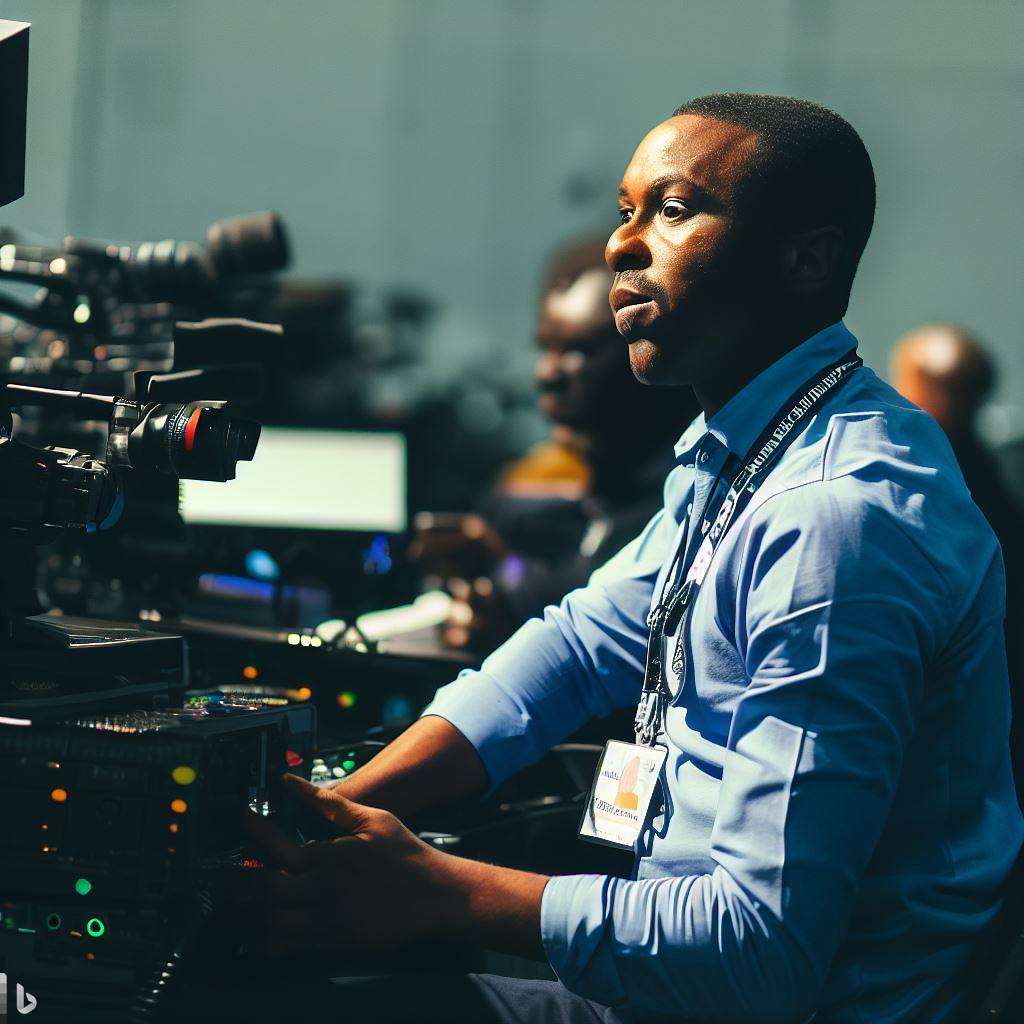Introduction
Nigeria, with its booming television industry, has become the hub of creative content in Africa.
From captivating dramas to engaging talk shows, the Nigerian television landscape has grown exponentially over the years.
As a television producer in this dynamic industry, I have had the privilege of witnessing the inner workings and challenges faced by those behind the camera.
One of the main challenges we encounter as television producers in Nigeria is the constant need for innovation.
With viewers’ tastes constantly evolving, we must stay ahead of the game, brainstorming fresh and exciting ideas in order to capture their attention.
This involves research, collaboration with creative teams, and the ability to adapt quickly to changes in the market.
Furthermore, the job of a television producer goes beyond just crafting compelling content. We also have to deal with tight budgets and demanding production schedules.
From securing funding to managing resources effectively, every decision we make impacts the final product that reaches the viewers’ screens.
Another aspect that sets being a Nigerian television producer apart is the cultural diversity we encounter.
Nigeria is home to over 250 ethnic groups, each with its own unique customs and traditions.
As a result, we have to ensure that our content is inclusive, representative, and respectful of the various cultural backgrounds within our nation.
All in all, being a Nigerian television producer is a thrilling and challenging journey.
From constantly evolving content to managing budgets and schedules, we strive to create quality programming that resonates with our diverse audience.
Stay tuned as we delve deeper into the intricacies of this fascinating industry in the upcoming chapters of this blog!
Overview of the Nigerian Television Industry
Brief History of the Nigerian Television Industry
- Nigerian television industry started in 1959 with the establishment of the Western Nigeria Television.
- In 1962, the Nigerian Broadcasting Corporation was established to regulate radio and television broadcasting.
- In 1977, the Nigerian Television Authority (NTA) was created as the first national television network in Nigeria.
- Since then, the industry has witnessed rapid growth and development with the emergence of private television stations.
Current State and Significance of Television in Nigeria
- Television has become an integral part of Nigerian society, reaching millions of households.
- With a population of over 200 million, television plays a crucial role in disseminating information and entertainment.
- Nigerian television industry has undergone significant changes, with the introduction of digital broadcasting and the rise of cable and satellite television.
- Television programming in Nigeria includes news, dramas, reality shows, sports, and cultural programs.
Challenges and Opportunities faced by Nigerian Television Producers
1. Limited Funding
- Nigerian television producers face financial constraints due to limited funding from the government and private investors.
- This affects the quality of production and hampers the industry’s growth potential.
2. Lack of Infrastructure
- The Nigerian television industry grapples with inadequate infrastructure, including outdated equipment and insufficient technical facilities.
- This hinders the production process and limits creativity.
3. Content Proliferation
- Nigerian television producers face stiff competition from foreign television content, particularly from Hollywood and Bollywood.
- This poses a challenge in attracting and retaining viewership for locally produced content.
4. Piracy
- The rampant piracy of television content in Nigeria greatly affects the revenue streams of television producers.
- This discourages investment in quality programming and impedes the industry’s sustainability.
5. Regulatory Challenges
- Nigerian television producers often face regulatory challenges such as censorship and content restrictions.
- These regulations limit creative freedom and put constraints on the type of content that can be produced.
Despite the challenges, there are also opportunities for Nigerian television producers:
Growing Market
- With a large population and an increasing middle class, there is a growing demand for diverse television content.
- This presents an opportunity for producers to create innovative and engaging shows that cater to different audience preferences.
Digital Platforms
- The emergence of digital platforms and streaming services offers a new distribution channel for television producers.
- This allows for greater reach and potential monetization of content.
Collaborations and Partnerships
- Nigerian television producers can collaborate with international production companies and broadcasters to access funding, expertise, and global distribution networks.
- This opens doors for co-production opportunities and the export of Nigerian content to international markets.
In short, the Nigerian television industry has evolved significantly over the years.
While it faces challenges such as limited funding, infrastructure issues, content piracy, and regulatory constraints, there are also opportunities to tap into the growing market, leverage digital platforms, and establish collaborations.
Nigerian television producers have the potential to create high-quality and engaging content that reflects the diversity and richness of Nigerian culture.
Duties and Responsibilities of a Nigerian Television Producer
Define the role of a television producer and their importance in the production process
- A television producer is responsible for overseeing the entire production process of a television show.
- They play a crucial role in the planning, coordinating, and executing of every aspect of the production.
- A producer’s main responsibility is to transform an idea into a high-quality television program.
- They collaborate with writers, directors, actors, and other production teams to bring the vision to life.
- Their importance can’t be overstated, as they ensure smooth workflow and meet production deadlines.
- Producers are also responsible for securing funding and managing the financial aspects of the production.
Discuss the various responsibilities of a television producer in Nigeria
- In Nigeria, television producers have a wide range of responsibilities that contribute to the success of a show.
- They are involved in selecting and developing television concepts that resonate with the target audience.
- Producers oversee the scriptwriting process, providing guidance and making necessary revisions.
- They work closely with the production team to create a budget and manage expenses.
- Producers hire and manage the cast and crew, ensuring they have the necessary skills for the production.
- They oversee the pre-production activities such as location scouting, set design, and costume selection.
- During the production phase, producers monitor the progress, making adjustments as needed.
- They ensure that the production stays on schedule and within budget.
- Post-production activities like editing, sound design, and marketing also fall under the producer’s responsibility.
- Producers work with broadcasters and distributors to secure distribution deals for the television show.
Highlight the skills required to excel as a television producer in Nigeria
- Excellent organizational and time management skills are necessary to juggle multiple tasks and meet deadlines.
- Strong leadership and communication skills are essential for managing a diverse production team.
- A deep understanding of storytelling and creativity helps in shaping engaging television content.
- Financial acumen is crucial for managing budgets and negotiating deals with sponsors or broadcasters.
- Industry knowledge and network connections contribute to successful collaborations and partnerships.
- Problem-solving and decision-making skills are important for overcoming challenges during the production process.
- Adaptability and flexibility allow producers to navigate unexpected changes or setbacks.
- An eye for detail ensures that the final product meets quality standards and viewer expectations.
- Keeping up with emerging technologies and production techniques is vital for staying relevant in the industry.
Read: Exploring Remote Work Opportunities in Nigerian Telecom Sector

Challenges Faced by Nigerian Television Producers
Financial Constraints and Limited Resources
Nigerian television producers often face significant financial constraints and limited resources when creating content.
They have to work with limited budgets, which can restrict their creative choices and the overall quality of their productions.
Lack of access to adequate funding and insufficient government support further exacerbate this problem.
With limited resources, producers may have to compromise on various aspects of production, such as equipment, staffing, and location.
Their ability to bring their creative visions to life becomes restricted due to the financial challenges they face.
Impact of Piracy and Copyright Infringement
Piracy and copyright infringement pose significant challenges to Nigerian television producers.
The widespread availability of pirated content has a detrimental impact on their revenue streams.
Producers invest substantial amounts of money in creating high-quality television programs, but piracy undermines their ability to profit from their work.
Unauthorized reproduction and distribution of their content reduce their market share and devalue the industry as a whole.
Furthermore, copyright infringement makes it difficult for producers to recoup their investments and discourages creativity and innovation.
The fear of intellectual property theft stifles the development of new, original content, impacting the growth of the Nigerian television industry.
Competition and Struggle to Stand Out
With a saturated market, Nigerian television producers face intense competition and struggle to stand out from the crowd.
The industry is filled with numerous television stations and production companies vying for viewership and advertising revenue.
The struggle to differentiate their content and attract audience attention becomes a constant challenge for producers.
They must constantly come up with fresh ideas and innovative approaches to captivate viewers and stay ahead of their competitors.
Moreover, the lack of effective distribution channels and inadequate marketing strategies further compound the issue.
Even if producers create remarkable content, gaining visibility and reaching their target audience can be an uphill battle.
In fact, Nigerian television producers face a myriad of challenges. Limited resources and financial constraints hinder their ability to produce high-quality content.
Piracy and copyright infringement continue to threaten the industry’s viability and creative output.
Competition and the struggle to stand out in a saturated market make it an uphill battle for producers.
Addressing these challenges requires a concerted effort from all stakeholders in the Nigerian television industry.
Read: Exploring Careers: Being a TV Producer in Nigeria
Learn More: Balancing Objectivity in Nigeria’s Television Reporting
Success Stories: Notable Nigerian Television Producers
Profile and Discuss the Achievements of Successful Nigerian Television Producers
1. Mo Abudu
Mo Abudu is a renowned Nigerian television producer and media entrepreneur.
She is the founder of EbonyLife TV, a Pan-African entertainment network.
Abudu has achieved several milestones in her career, including producing critically acclaimed TV shows, such as “The Spot” and “Moments with Mo.”
She also made history as the first African woman to own a Pan-African TV channel.
2. Kunle Afolayan
Kunle Afolayan is a highly regarded Nigerian filmmaker and television producer.
He is known for his exceptional work in the Nigerian film industry, commonly referred to as Nollywood.
Afolayan has received numerous accolades for his movies, including “The Figurine” and “October 1.”
He is acclaimed for his storytelling prowess and ability to promote Nigerian culture through film.
3. Funke Akindele-Bello
Funke Akindele-Bello is a prolific Nigerian actress, producer, and television personality.
She gained popularity for her role in the TV series “Jenifa’s Diary,” which she also produced.
Akindele-Bello’s ability to captivate audiences with her comedic timing and relatable characters has made her a household name in Nigeria and beyond.
As a television producer, she has successfully created engaging content loved by many.
Analyze their Strategies, Innovations, and Contributions to the Industry
1. Strategic Collaborations
Successful Nigerian television producers have utilized strategic collaborations to expand their reach and deliver high-quality content.
They have formed partnerships with local and international production houses, actors, and crew members to create compelling TV shows with global appeal.
2. Embracing Cultural Heritage:
Notable Nigerian television producers like Kunle Afolayan have played a pivotal role in showcasing Nigeria’s rich cultural heritage through their productions.
They incorporate local languages, traditions, and settings into their shows, allowing viewers to connect with their roots while enjoying captivating storylines.
3. Investing in Talent Development:
These producers understand the importance of nurturing talent within the industry.
They provide opportunities for aspiring actors, writers, directors, and technicians to learn and grow through mentorship programs, workshops, and auditions.
By investing in talent development, they contribute to the growth and sustainability of the Nigerian television industry.
Highlight the Impact These Producers Have Had on Nigerian Television
1. Global Recognition
The achievements of Nigerian television producers have brought global recognition to the industry.
Their work has been acknowledged at international film festivals and award ceremonies, helping to position Nigeria as a prominent player in the global entertainment landscape.
2. Economic Growth
Successful Nigerian television producers have contributed to the growth of the country’s economy by creating employment opportunities and attracting investments in the entertainment sector.
Their productions have generated revenue through partnerships and distribution deals, supporting the growth of the local industry.
3. Cultural Preservation
Through their TV shows and films, these producers have helped preserve Nigerian culture and heritage.
They celebrate the diversity and uniqueness of Nigeria by promoting local languages, traditional values, and historical narratives, ensuring that they are not lost or forgotten.
In the end, notable Nigerian television producers like Mo Abudu, Kunle Afolayan, and Funke Akindele-Bello have made significant contributions to the industry through their achievements, strategies, innovations, and impact.
Their success stories serve as inspiration for aspiring producers and contribute to the growth and recognition of the Nigerian television industry on a global scale.
Read: The Landscape of Television Production in Nigeria Today
Insights into the Life of a Nigerian Television Producer
Share personal experiences and anecdotes from Nigerian television producers
- As a Nigerian television producer, I have had my fair share of challenges and triumphs.
- One memorable experience was when I had to shoot a live music performance in a remote village.
- We had to bring our own equipment, navigate through rough terrain, and deal with unpredictable weather conditions.
- Despite all the difficulties, it was incredibly fulfilling to capture the genuine talent and passion of the local musicians.
- Another anecdote involves a last-minute change in the script, which required us to shoot an entire scene overnight.
- It was a grueling experience, but the adrenaline rush and the satisfaction of meeting the deadline made it worth it.
- These personal experiences have taught me the importance of adaptability, resilience, and teamwork in this industry.
Discuss the joys, rewards, and fulfillment of working in the industry
- Working as a television producer in Nigeria comes with its fair share of joys and rewards.
- One of the most fulfilling aspects is the ability to create content that resonates with the audience.
- When our shows receive positive feedback and make a meaningful impact on viewers, it’s truly gratifying.
- The collaborative nature of television production also brings immense joy.
- Building strong relationships with directors, writers, and actors fosters a creative and supportive work environment.
- Witnessing the growth and success of the team is incredibly rewarding.
- Moreover, the industry offers opportunities for personal and professional development.
- Attending workshops, learning new production techniques, and staying updated with technology add to the fulfillment of being a producer.
Expose the realities, sacrifices, and hard work required to succeed as a television producer in Nigeria
- While there are joys and rewards, it is important to expose the realities of being a television producer in Nigeria.
- The profession demands long working hours, often stretching well into the night.
- Meeting tight deadlines and working under pressure becomes a routine part of life.
- Sacrificing personal time, family commitments, and social activities is inevitable in pursuit of excellence.
- Navigating through financial constraints and limited resources is a constant challenge.
- Securing sponsorships and funding for projects requires persistent effort and negotiation skills.
- Moreover, the industry can be highly competitive, making it essential to continuously hone skills and stay ahead.
- Despite these realities and sacrifices, the satisfaction of seeing a successful production on screen makes it all worthwhile.
In essence, the life of a Nigerian television producer is a rollercoaster ride filled with personal experiences, rewards, and sacrifices.
It requires adaptability, resilience, and hard work to succeed, but the fulfillment derived from creating impactful content and witnessing the growth of a dedicated team makes the journey worthwhile.
Read: TV Producers in Nigeria: Challenges and Triumphs
Conclusion
In this exploration, we delved into the intricate journey of a Nigerian television producer, unearthing both their trials and triumphs.
These producers wield substantial influence, molding the nation’s media sphere and harboring the potential for impactful transformations.
Encouragingly, embracing the domestic television sector in Nigeria bears significance.
It not only amplifies cultural variety but also emboldens indigenous aptitude, propelling economic expansion.
Together, let’s nurture the advancement of Nigerian television producers, showcasing our unwavering endorsement.




